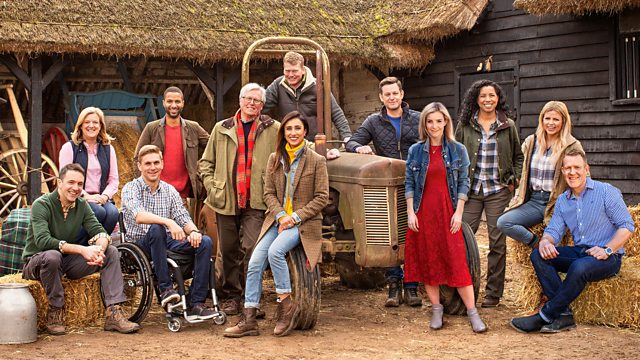
East Sussex
John Craven and Helen Skelton are in East Sussex, where Helen discovers a long-forgotten chronicler of the county's rural past and John takes a stroll around Batemans.
John Craven and Helen Skelton are in East Sussex, where Helen meets the shepherds keeping the old southdown sheep breed alive. She discovers a long-forgotten chronicler of the county's rural past and meets 67-year-old Shaun Payne, who tells her the secrets of the mysterious shepherd's crowns. Helen then goes on a fossil hunt with some local schoolchildren, and dinosaur hunter Ken Brooks shows Helen the footprints of what is said to be an iguanodon.
John takes a stroll round the genteel grounds of Batemans, a grand country house where Rudyard Kipling sought solace and peace. John then takes a turn in a boat on Kipling's Pond, built with the money the author won for the 1907 Nobel Prize for Literature.
Joe Crowley's first stint on Countryfile sees him right in the thick of it with the Sussex Wildlife Ambulance. The team is called out to a stag that is in distress and Joe is on hand to help out.
Meanwhile, Adam Henson learns how the latest cutting-edge science is being used to detect animal diseases early.
Also, the British beaver lost its battle against extinction hundreds of years ago, but now they are back on a river in Devon. However, as Tom Heap discovers, they may have brought an unwelcome visitor with them.
Last on
Helen and the Southdown sheep

Helen Skelton visits the rolling chalk hills of East Sussex. This area isn’t just famous for the Seven Sisters, a large flock of Southdown sheep call this area home too. The Southdown was developed in Sussex in the 18th Century, but became rare after the Second World War. Luckily the breed is now thriving but, as Helen discovers, it does take some looking after. Helen meets local farmer, Richard Gorringe, and discovers more about his incredible passion for this special breed.
Kipling’s Sussex home

John Craven goes on a literary journey when he visits Bateman’s. The exquisite house is nestled in the Dudwell Valley and was once home to Rudyard Kipling. The surrounding landscape became a huge inspiration to the famous writer. With the help of experts John Walker and Mike Lacey, John finds out more about Rudyard Kipling’s life here. He discovers Kipling’s greatest joys but also learns about the tragic side of his time at Bateman’s.
Joe’s animal rescue

Twenty-four hours a day, seven days a week the East Sussex Wildlife Rescue and Ambulance Service is on call. Joe Crowley visits the hub of the operation, the Casualty Centre, where he meets a poorly hedgehog with a rather bunged up nose. But it’s not long before Joe hits the road with founding member, Trevor Weeks. Their mission is to rescue a much bigger and potentially more dangerous animal which has got itself into bit of a mess.
��Surrogate cows

Adam Henson reaches for the shampoo but it’s not for personal grooming. He is helping with the washing and training of three very young bulls in preparation for their first big show. Once they’re spruced up, Adam travels to Leicestershire to see some rather unusual cows. He meets a farmer who uses a technique called embryo flushing. Fertilised embryos are taken from recently pregnant cows and placed into cattle which are then used as surrogates. This system can produce more high quality calves than if nature was left to its own devices.
Devon beavers

Tom Heap tells the story of the Devon beavers, the only wild colony of beavers in England. Although members of the local Wildlife Trust are pleased to see them, Defra is concerned that these animals may have become infected by a deadly parasite, which at the moment has been kept out of the UK. Tom asks what’s going to happen to the beavers now and investigates wider concerns about the parasites that they could be carrying.��
Barclay Wills

Born in Islington in the 1870s, little-known author Barclay Wills was always passionate about the countryside. As an adult he moved to Sussex, where he loved to take walks in the stunning chalk downlands. In the 1920s and 1930s Barclay sought to record the lives of the shepherds who roamed this area before their way of life was lost forever. Helen meets expert, Shaun Payne, to find out more about Barclay’s life and the incredible bygones that he left behind.
Helen goes fossil hunting
Millions of years ago dinosaurs roamed the area that is now Pett Level on the East Sussex coast. Evidence of these spectacular creatures can still be found as the sea is constantly churning up the beach and revealing fresh finds. With the help of local geologist, Ken Brooks, and some budding fossil hunters, Helen goes in search of dinosaur footprints. But will they find anything?
Kipling’s pond

Rudyard Kipling didn’t like to accept awards, in fact he famously turned down a knighthood. But in 1907 he did accept the Nobel Prize for Literature. The prize awarded was a staggering seven thousand guineas which was put to good use by paying for a pond in his garden. As John discovers, one of Kipling’s greatest joys was seeing people fall in – including his own mother. The author also had made a hand cranked paddle-boat. Helen and John get to have a go in a replica of it, but will they do Kipling the courtesy of falling in too?
Credits
| Role | Contributor |
|---|---|
| Presenter | John Craven |
| Presenter | Helen Skelton |
| Presenter | Adam Henson |
| Presenter | Tom Heap |
| Presenter | Joe Crowley |
| Executive Producer | William Lyons |
| Series Producer | Joanna Brame |
